LG Electronics Bundle
What Drives LG Electronics' Success?
Explore the core principles that propel LG Electronics, a global technology powerhouse, forward. Understanding a company's mission, vision, and core values is crucial for investors and strategists alike. Discover how these elements shape LG's LG Electronics SWOT Analysis and its approach to innovation.
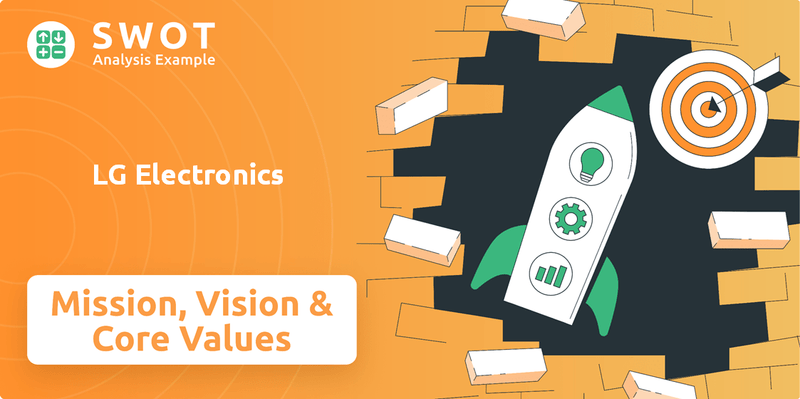
Delving into LG Electronics' mission, vision, and core values provides invaluable insights into its long-term strategy and commitment to stakeholders. These foundational statements, also known as LG's corporate philosophy, are not merely symbolic; they actively guide the company's business goals and decision-making processes. Understanding these elements is key to grasping LG's position in the market and its future direction, encompassing everything from ethical guidelines to its approach to innovation and sustainability.
Key Takeaways
- LG's customer-centric mission and vision drive innovation and strategic expansion.
- Core values of innovation, warmth, challenge, and sustainability guide ethical operations.
- Strategic shifts into B2B and non-hardware models reflect commitment to connected experiences.
- Sustainability efforts enhance brand appeal and responsible corporate citizenship.
- Alignment with guiding principles fosters growth and adaptation in a dynamic market.
Mission: What is LG Electronics Mission Statement?
LG Electronics' mission is "to be #1 LG by creating a better life with our customers."
Let's delve into the core of LG Electronics' purpose and aspirations.
The LG Electronics Mission centers on global innovation and enhancing customer lives. It's a concise statement, yet it encapsulates the company's core drive. This mission guides all aspects of the company's operations, from product development to market strategy.
LG's target audience is broad, focusing on consumers worldwide. The company aims to provide value through a diverse range of products, including TVs, home appliances, and mobile devices. The market scope is undeniably global, reflecting LG's ambition.
LG offers a wide array of products and services designed to bring added value. This includes innovative technologies like AI-powered fabric care and energy-efficient appliances. This commitment is crucial to achieving its LG Business Goals.
The unique value proposition of LG lies in its dedication to "creating a better life with our customers." This is achieved through continuous innovation. This customer-centric approach is a cornerstone of the LG Corporate Philosophy.
LG's mission is evident in its product development. For instance, its 2025 OLED TVs are eco-certified, demonstrating a commitment to sustainability. This focus on environmental impact showcases how LG's mission extends to societal well-being.
The mission is strongly customer-centric, with a focus on improving customer lives. It is also innovation-focused, driven by the development of new technologies and solutions. This is a key element of the LG Company Strategy.
LG's mission statement is a guiding principle, influencing every facet of its operations. It's a commitment to innovation and customer satisfaction, driving the company's long-term vision. For a deeper understanding of how LG generates revenue to fulfill this mission, explore the Revenue Streams & Business Model of LG Electronics.
LG Electronics SWOT Analysis
- Complete SWOT Breakdown
- Fully Customizable
- Editable in Excel & Word
- Professional Formatting
- Investor-Ready Format
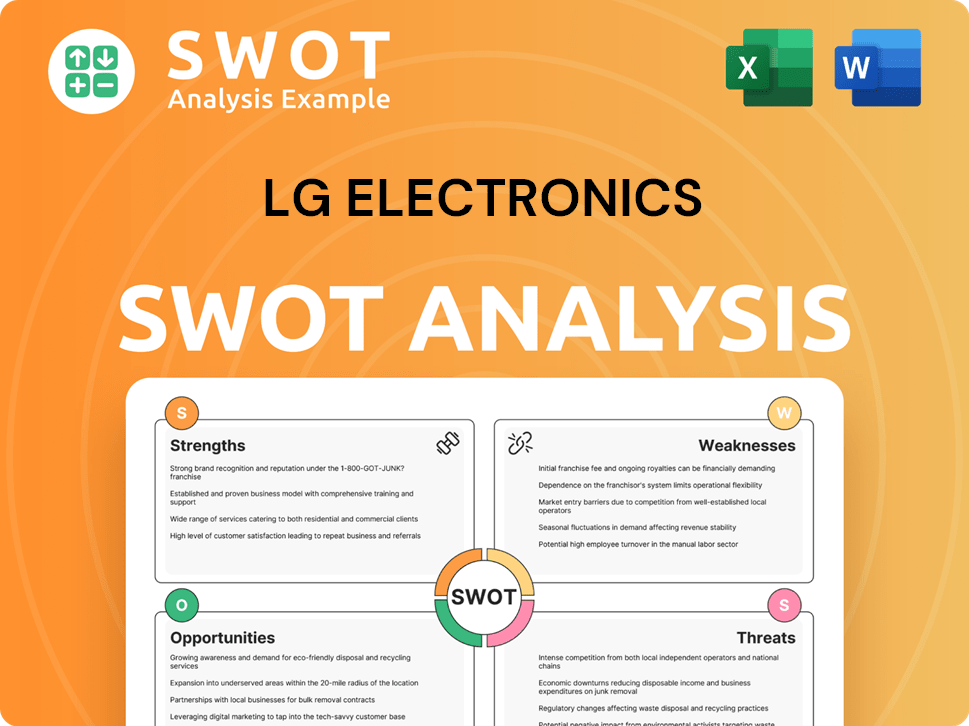
Vision: What is LG Electronics Vision Statement?
LG Electronics' vision is to transform into a 'Smart Life Solution Company' that connects and expands customer experiences across home, commercial, mobility, and virtual spaces.
Let's delve into the specifics of LG Electronics' vision and its implications.
LG's 'Future Vision 2030' is a forward-looking statement that outlines the company's aspirations. The goal is to evolve beyond its traditional consumer electronics and appliance focus. This involves creating integrated solutions that enhance customer experiences across various environments.
The core of LG's vision centers on moving from a device-centric business model to one that offers comprehensive solutions. This strategic shift aims to provide seamless and interconnected experiences. This approach is designed to cater to the evolving needs of consumers and businesses alike.
LG's vision encompasses a broad spectrum of environments. This includes homes, commercial spaces, mobility solutions, and virtual realms. By integrating its technologies across these areas, LG aims to create a cohesive and enhanced user experience.
The feasibility of LG's vision is supported by its current trajectory and market position. The company's financial performance, including record revenue of KRW 87.73 trillion (approximately USD 66.7 billion) in 2024, indicates a strong foundation for future growth. LG's strategic investments and focus on high-growth B2B sectors further solidify its commitment to achieving its goals.
LG's strategic pivot towards the B2B sector is a critical component of its vision. The company aims to increase the B2B share to 45% by 2030, with projected B2B sales exceeding USD 14.6 billion in 2025. This focus on sectors like automotive components and HVAC systems will be instrumental in driving the company's transformation.
LG's commitment to investing over KRW 50 trillion by 2030 underscores its dedication to portfolio transformation and qualitative growth. These investments will support the development of cutting-edge technologies and solutions. This will help LG achieve its vision of becoming a 'Smart Life Solution Company'.
The Growth Strategy of LG Electronics provides further insights into the company's strategic initiatives.
LG Electronics PESTLE Analysis
- Covers All 6 PESTLE Categories
- No Research Needed – Save Hours of Work
- Built by Experts, Trusted by Consultants
- Instant Download, Ready to Use
- 100% Editable, Fully Customizable
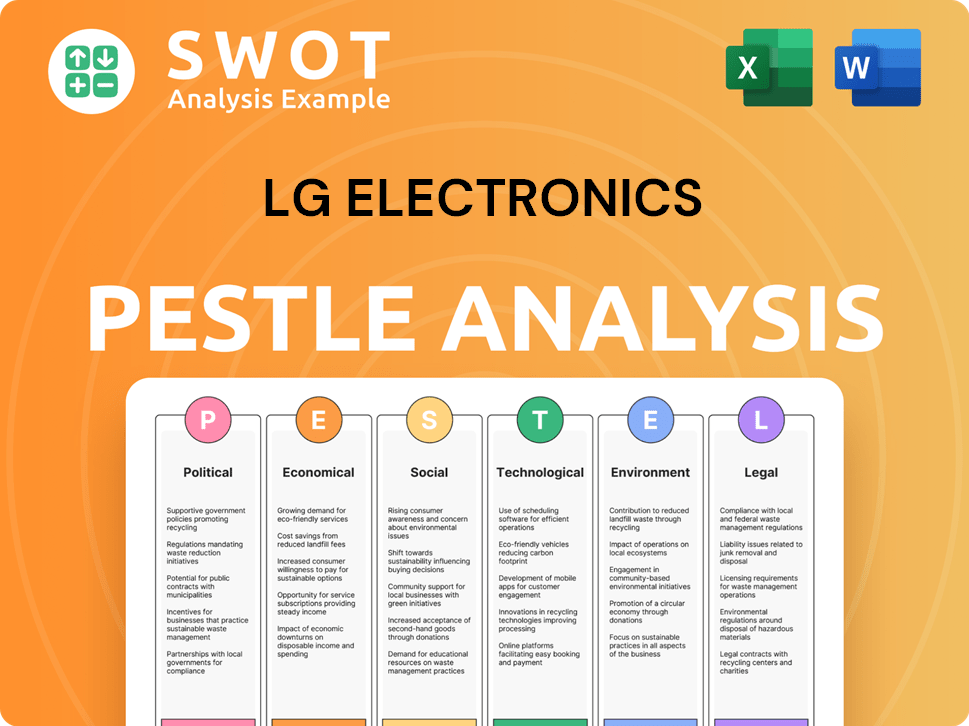
Values: What is LG Electronics Core Values Statement?
While LG Electronics doesn't explicitly publish a rigid list of core values, their actions and communications reveal a set of guiding principles. These values shape the company's identity and drive its approach to innovation, customer relations, and sustainability, as highlighted in their overall Mission, Vision & Core Values of LG Electronics.
This value prioritizes creating products and solutions that genuinely improve customers' lives. It's evident in LG's focus on user-friendly designs, such as the NeoChef Microwave Ovens, and significant R&D investments to meet evolving consumer needs. This approach also reflects in LG's commitment to providing accessible technology, ensuring inclusivity in their product offerings.
LG aims to evoke positive emotions and enhance customer experiences through its products and services. This is reflected in aesthetically pleasing and intuitive product designs, and a customer-centric approach focused on delivering unique experiences. This value is encapsulated in their 'Life's Good' marketing theme, aiming to create products that bring joy and connection.
Rooted in its founding spirit, LG embraces a proactive stance towards market dynamics and technological advancements. This drives continuous innovation, as seen in their leadership in OLED technology and ventures into AI and robotics. This is also shown in strategic shifts like expanding B2B operations and subscription services, demonstrating adaptability.
LG is deeply committed to environmental and social responsibility. This is evident in their eco-certifications for sustainable design, with a plan to increase recycled plastic use to 50% by 2025. Furthermore, LG aims for carbon neutrality by 2030 and a transition to 100% renewable energy by 2050, showcasing their dedication to a greener future.
These core values of LG Electronics, encompassing innovation, customer focus, adaptability, and sustainability, differentiate the company and guide its strategic decisions. Understanding these values is crucial to comprehending LG's overall strategy and its impact on the market. Now, let's explore how LG's mission and vision influence the company's strategic decisions.
How Mission & Vision Influence LG Electronics Business?
The mission, vision, and core values of LG Electronics are not merely abstract statements; they are the guiding principles that shape its strategic decisions and drive its business forward. This influence is evident in the company's commitment to innovation, customer-centricity, and sustainable practices, all of which contribute to its long-term success.
LG Electronics' vision to become a 'Smart Life Solution Company' directly influences its move into high-growth B2B sectors. This strategic shift aims to expand customer experiences beyond traditional consumer electronics, focusing on integrated solutions for commercial and mobility spaces.
- LG projects B2B sales to exceed KRW 20 trillion (approximately USD 14.6 billion) in 2025.
- B2B sales are targeted to reach 45% of total revenue by 2030, up from 35% in 2024.
- The Vehicle Component Solutions (VS) division achieved record quarterly results in Q1 2025, with KRW 2.84 trillion in revenue and KRW 125.1 billion in operating profit.
LG's vision of becoming a 'Smart Life Solution Company' is supported by its focus on non-hardware business models, such as subscription services and webOS-based advertising and content. This diversification enhances customer engagement and creates recurring revenue streams.
LG's mission of developing new innovations and its vision of providing smart life solutions are directly supported by significant investments in R&D. This focus drives advancements in areas like AI, robotics, and next-generation computing.
LG's core values are reflected in its strong commitment to sustainability, influencing product development and business practices. This commitment shapes market expansion as consumers increasingly prioritize sustainable options.
CEO William Cho emphasizes connecting mission, vision, and goals with 'a relentless focus on execution.' This leadership perspective highlights how the mission and vision shape day-to-day operations by prioritizing customer value and long-term planning by driving strategic investments and portfolio transformation.
In 2024, revenue from home appliance subscriptions surged by over 75%, nearing KRW 2 trillion. The webOS-based advertising and content business also surpassed KRW 1 trillion in annual revenue in 2024.
LG aims to achieve carbon neutrality by 2030 and transition to 100% renewable energy by 2050. They are committed to increasing recycled plastic use to 50% by 2025.
The alignment of LG's mission, vision, and core values with its strategic initiatives demonstrates a cohesive approach to business. This integrated strategy, as further detailed in a comprehensive Marketing Strategy of LG Electronics, ensures that every action taken by the company contributes to its long-term goals. This commitment to values and strategic execution positions LG for continued growth and success. To delve deeper into how LG is refining its core principles, let's explore the next chapter: Core Improvements to Company's Mission and Vision.
LG Electronics Business Model Canvas
- Complete 9-Block Business Model Canvas
- Effortlessly Communicate Your Business Strategy
- Investor-Ready BMC Format
- 100% Editable and Customizable
- Clear and Structured Layout
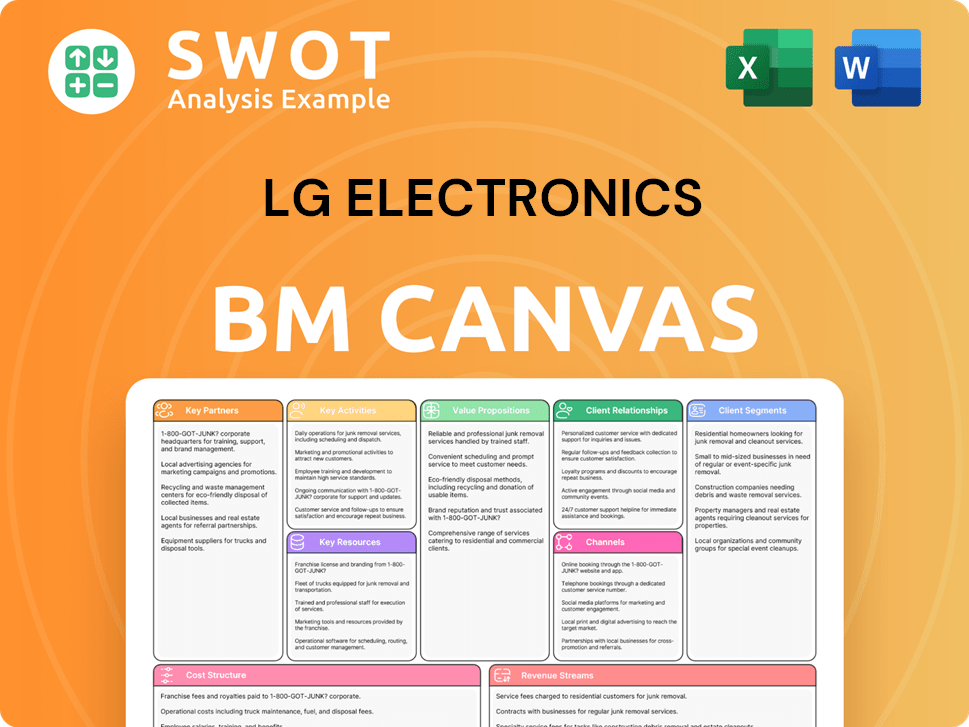
What Are Mission & Vision Improvements?
While LG Electronics demonstrates a strong foundation in its mission, vision, and values, strategic refinements can enhance its clarity and relevance in a rapidly evolving market. These improvements aim to solidify LG's position as a leader in innovation and sustainability, aligning with emerging technologies and consumer expectations.
To strengthen its mission, LG could explicitly integrate the concept of 'connected experiences.' This would better reflect its 'Smart Life Solution Company' vision and the growing importance of the Internet of Things (IoT). A refined mission might articulate how LG's electronic products will interact within a broader ecosystem, creating a smarter, more sustainable future for its customers. For example, this could be achieved by stating, "To innovate and deliver seamlessly connected electronic solutions that enrich lives and create a smarter, more sustainable future with our customers."
LG's vision statement can be enhanced by explicitly highlighting its commitment to cutting-edge technologies like AI and robotics. This would provide greater clarity on its future strategic focus, especially considering its substantial R&D investments in these areas. Adding a phrase like 'leveraging advanced AI and robotics to create intelligent, interconnected experiences across all aspects of life' would better reflect LG's strategic priorities and align with competitors' marketing efforts. The company's R&D spending, with over 75% allocated to AI, robotics, and next-generation computing, demonstrates the importance of this focus.
To address evolving consumer behaviors and sustainability concerns, LG could refine its core values to include a more explicit emphasis on 'circularity' or 'resource efficiency.' While LG demonstrates a commitment to sustainability, formalizing this as a core value would underscore its leadership in the circular economy. This would position LG as a leader in not just producing, but also managing the lifecycle of its products, resonating with environmentally conscious consumers. LG's 2025 goal of recycling 50 million pounds of e-waste, a 15% increase over 2024, shows a strong dedication to this area.
LG can further enhance its core values by explicitly promoting transparency and ethical conduct in all its operations. This could involve clearly stating commitments to fair labor practices, responsible sourcing, and data privacy. Such values would not only build trust with consumers but also strengthen LG's brand reputation and contribute to its long-term success. This aligns with the increasing importance of corporate social responsibility and ethical business practices. To learn more about the company's background, check out this Brief History of LG Electronics.
How Does LG Electronics Implement Corporate Strategy?
The successful implementation of a company's mission, vision, and core values is crucial for achieving its strategic objectives and fostering a strong organizational culture. LG Electronics demonstrates its commitment to these principles through a multifaceted approach, integrating them into its business practices, leadership, and stakeholder communications.
LG Electronics actively translates its LG Electronics Mission and LG Electronics Vision into concrete actions. A key element is the strategic pivot towards the B2B sector and non-hardware business models, reflecting a forward-thinking LG Company Strategy.
- B2B Expansion: LG aims to increase B2B sales to 45% of total revenue by the end of the decade, up from 35% in 2024.
- Vehicle Component Solutions (VS) Division: Significant growth in this area aligns with the vision of expanding into mobility solutions.
- HVAC Business Growth: The expansion of the HVAC business, managed under the LG Eco Solution Company, further demonstrates the move into commercial spaces.
- 'Smart Life Solution Company' Transformation: These initiatives directly support the vision of transforming into a 'Smart Life Solution Company.'
Leadership plays a pivotal role in reinforcing LG’s guiding principles. CEO William Cho's 'Future Vision 2030' is LG's long-term goal to transform into a 'Smart Life Solution Company'.
He has emphasized the importance of navigating uncertainties and exploring growth opportunities, demonstrating a top-down commitment to the company's LG Corporate Philosophy.
LG ensures consistent communication of its LG Electronics Core Values across all stakeholder touchpoints. The brand promise of 'Life's Good' is unified globally, ensuring consistent messaging.
This includes integration into marketing, ESG (Environmental, Social, and Governance), and CSR (Corporate Social Responsibility) activities, reinforcing the underlying values and philosophy.
LG demonstrates its commitment to environmental responsibility through concrete actions. For instance, LG OLED TVs for 2025 have received eco-certifications for sustainable design and reduced carbon footprint.
The company plans to increase its use of recycled plastic in TV production to 50% in 2025, up from approximately 30% in 2024. Furthermore, LG's 'Life's Good Deeds' initiative in Singapore, working with local non-profit organizations to uplift communities and champion environmental sustainability, provides tangible evidence of their social responsibility and commitment to a 'Better Life for All.'
LG utilizes formal programs and systems to ensure alignment with its mission and vision. Large-scale IT investments are being made to establish digital transformation (DX) across the entire organization.
Building a 'Next-generation Enterprise Resource Planning (N-ERP)' system to seamlessly integrate business processes and systems supports the efficient implementation of their LG Business Goals. Additionally, LG has established six strategic tasks for ESG management, focusing on '3Cs' for the planet (carbon neutrality, circularity, and clean technology) and '3Ds' for people (design for all, decent workplace, and diversity & inclusion), which are formal frameworks for ensuring alignment with their values. To understand the target market of LG Electronics, consider reading the article Target Market of LG Electronics.
LG Electronics Porter's Five Forces Analysis
- Covers All 5 Competitive Forces in Detail
- Structured for Consultants, Students, and Founders
- 100% Editable in Microsoft Word & Excel
- Instant Digital Download – Use Immediately
- Compatible with Mac & PC – Fully Unlocked
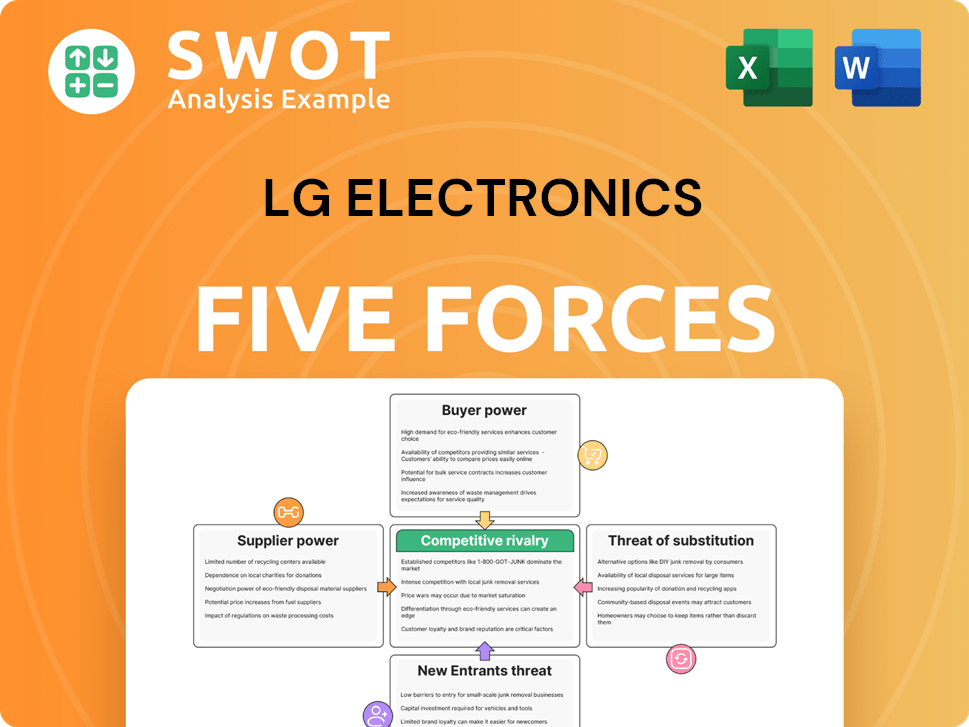
Related Blogs
- What are Mission Vision & Core Values of LG Electronics Company?
- What is Competitive Landscape of LG Electronics Company?
- What is Growth Strategy and Future Prospects of LG Electronics Company?
- How Does LG Electronics Company Work?
- What is Sales and Marketing Strategy of LG Electronics Company?
- Who Owns LG Electronics Company?
- What is Customer Demographics and Target Market of LG Electronics Company?
Disclaimer
All information, articles, and product details provided on this website are for general informational and educational purposes only. We do not claim any ownership over, nor do we intend to infringe upon, any trademarks, copyrights, logos, brand names, or other intellectual property mentioned or depicted on this site. Such intellectual property remains the property of its respective owners, and any references here are made solely for identification or informational purposes, without implying any affiliation, endorsement, or partnership.
We make no representations or warranties, express or implied, regarding the accuracy, completeness, or suitability of any content or products presented. Nothing on this website should be construed as legal, tax, investment, financial, medical, or other professional advice. In addition, no part of this site—including articles or product references—constitutes a solicitation, recommendation, endorsement, advertisement, or offer to buy or sell any securities, franchises, or other financial instruments, particularly in jurisdictions where such activity would be unlawful.
All content is of a general nature and may not address the specific circumstances of any individual or entity. It is not a substitute for professional advice or services. Any actions you take based on the information provided here are strictly at your own risk. You accept full responsibility for any decisions or outcomes arising from your use of this website and agree to release us from any liability in connection with your use of, or reliance upon, the content or products found herein.